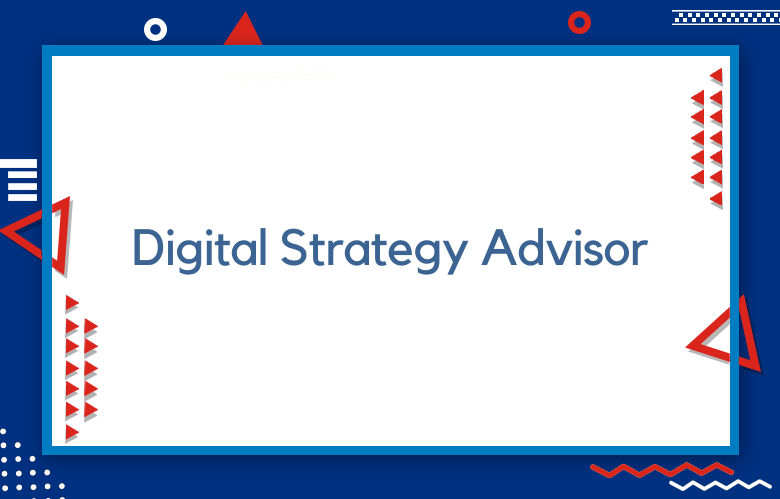Digital Strategy Advisor: Importance of a strong Digital Strategy

In today’s rapidly evolving digital landscape, the importance of a solid digital strategy cannot be overstated. A cohesive and effective digital approach has become paramount as businesses migrate to online operations. A digital strategy is a blueprint for leveraging digital technologies to achieve business objectives, enhance customer engagement, and drive growth.
Digital Strategy Advisor: Importance of a robust Digital Strategy
At its core, a robust digital strategy aligns an organization’s digital initiatives with its overall business goals. This alignment ensures that every digital effort, from social media marketing to e-commerce development, contributes to the company’s success. Without a well-defined strategy, businesses risk wasting resources on disjointed digital activities that fail to produce meaningful results.
One of the primary benefits of a solid digital strategy is improved customer experience. In an era where consumers expect seamless, personalized interactions across various digital touchpoints, businesses must deliver consistent, high-quality experiences. A comprehensive digital strategy helps organizations understand customer needs, preferences, and behaviors, enabling them to create tailored experiences that foster loyalty and satisfaction.
Moreover, a solid digital strategy enhances operational efficiency. By integrating digital tools and processes, businesses can streamline operations, reduce costs, and improve productivity. For instance, automation technologies can handle repetitive tasks, freeing employees to focus on more strategic activities. Data analytics can provide valuable insights into market trends and customer behavior, informing better decision-making and strategy adjustments.
What is a Digital Strategy?
A digital strategy is a detailed plan that leverages digital technologies to achieve specific business objectives. It encompasses using various digital channels, platforms, and tools to enhance a company’s operations, engage customers, and drive growth. At its core, a digital strategy integrates digital initiatives with the overall business strategy, ensuring a cohesive and practical approach to exploiting digital opportunities.
This strategy is a blueprint for how an organization will utilize digital resources to improve customer experiences, streamline operations, and gain a competitive edge in the market. By aligning digital efforts with business goals, a robust digital strategy helps companies navigate the complexities of the digital landscape and achieve sustained success.
Who is a Digital Strategy Advisor?
A Digital Strategy Advisor is a professional who helps organizations develop and implement effective digital strategies to achieve their business goals. Their role encompasses a wide range of responsibilities, including:
Strategic Planning
Collaborating with leadership to define digital objectives, align them with overall business goals, and create a roadmap for digital transformation.
Market Analysis
Analyzing market trends, competitor activities, and customer behaviors to identify opportunities and threats in the digital landscape.
Technology Integration
Advising on selecting and implementing digital tools and platforms to enhance business operations, customer engagement, and overall efficiency.
Data-Driven Decision Making
Utilizing data analytics to inform strategy, measure performance, and optimize digital initiatives.
Customer Experience
Designing and improving digital customer journeys to enhance satisfaction and loyalty.
Innovation and Trends
Keeping abreast of the latest digital trends and technologies ensures the organization remains competitive and innovative.
Change Management
Guiding organizations through the cultural and operational changes necessary for successful digital transformation.
Performance Metrics
Establishing key performance indicators (KPIs) to track the effectiveness of digital strategies and make adjustments as needed.
A Digital Strategy Advisor combines technology, business strategy, and market dynamics expertise to help organizations navigate the complexities of the digital world and achieve sustainable growth.
What is a Digital Strategy Advisor?
A Digital Strategy Advisor is a professional who specializes in helping organizations develop and implement effective digital strategies. This role involves analyzing a company’s current digital presence, identifying opportunities for improvement, and crafting a comprehensive plan to leverage digital technologies for business growth.
Digital Strategy Advisors provide expert guidance in various areas, including digital marketing, online customer engagement, data analytics, and technology integration. By staying up-to-date with the latest digital trends and best practices, businesses can navigate the ever-evolving digital landscape, enhance their competitive edge, and achieve their strategic objectives.
Key Responsibilities and Skills of a Digital Strategy Advisor
A Digital Strategy Advisor is responsible for helping businesses navigate the digital landscape, develop online strategies, and improve their overall digital presence. Essential skills and responsibilities include:
Responsibilities
- You are assessing a company’s digital maturity and identifying areas for improvement.
- We are developing and implementing tailored digital strategies aligned with business goals.
- We are conducting market research and staying up-to-date with digital trends and technologies.
- We are advising on digital transformation initiatives and change management.
- We are collaborating with cross-functional teams to ensure the successful implementation of digital strategies.
- We are analyzing and reporting on the performance of digital initiatives.
Skills
- Strong understanding of digital technologies, platforms, and trends.
- Strategic thinking and problem-solving abilities.
- Excellent communication and interpersonal skills.
- Analytical and data-driven decision-making capabilities.
- Adaptability and agility in a fast-paced digital environment.
- Project management and organizational skills.
- Creativity and innovation in devising digital strategies.
- Knowledge of digital marketing, customer experience, and user journey mapping.
A skilled Digital Strategy Advisor is essential for businesses looking to thrive in the ever-evolving digital landscape, ensuring they remain competitive and maximize opportunities for growth and success.
Importance of a robust digital strategy
In today’s fast-paced digital world, the importance of a solid digital strategy cannot be overstated. As businesses increasingly rely on digital channels and technologies to reach their customers and streamline operations, having a well-defined digital strategy has become essential for success.
A robust digital strategy provides a clear roadmap for leveraging digital tools to achieve business goals, enhance customer experiences, and stay competitive. It aligns digital initiatives with overall business objectives, ensuring that every effort contributes to the company’s growth and success. Without a robust digital strategy, businesses risk falling behind competitors and missing out on valuable opportunities in the digital landscape.
Critical components of a successful digital strategy
A successful digital strategy is essential for any organization thriving in today’s digital era. It involves a comprehensive plan integrating various digital initiatives to achieve specific business goals. The critical components of a successful digital strategy include clear objectives, an in-depth understanding of the target audience, and the effective use of digital channels and platforms.
It encompasses a well-defined content strategy, integrating advanced technologies and tools and robust data analytics to inform decision-making. Proper resource allocation, an actionable implementation plan, and continuous measurement and evaluation are also critical. Together, these components ensure that the digital strategy aligns with the organization’s objectives and drives sustained growth and competitive advantage in the digital landscape.
Unlocking Growth with Data-Driven Digital Strategies
Unlocking growth with data-driven digital strategies involves leveraging data to inform decisions, optimize operations, and enhance customer experiences. Here are some key strategies to achieve this:
Personalized Marketing
- Use customer data to create customized marketing campaigns.
- Segment audiences based on behavior, preferences, and demographics to deliver targeted messages.
- Implement AI-driven recommendation engines to suggest products or services.
Customer Journey Mapping
- Analyze data to understand the customer journey and identify touchpoints.
- Optimize each touchpoint to improve the overall customer experience.
- Use predictive analytics to anticipate customer needs and behaviors.
Performance Analytics
- Establish key performance indicators (KPIs) and track them rigorously.
- Use dashboards and visualization tools to monitor performance in real time.
- Implement A/B testing to optimize digital initiatives continuously.
Content Optimization
- Analyze engagement data to understand which content resonates with your audience.
- Use SEO and content analytics to optimize content for search engines and user experience.
- Personalize content delivery based on user preferences and behavior.
Customer Feedback Loops
- Collect and analyze customer feedback through surveys, reviews, and social media.
- Use this data to improve products, services, and customer support.
- Implement sentiment analysis to gauge customer sentiment and address issues proactively.
Predictive Analytics
- Use historical data to predict future trends and customer behaviors.
- Implement predictive models to forecast sales, demand, and inventory needs.
- Leverage predictive insights to inform strategic planning and decision-making.
Automated Marketing Campaigns
- Use marketing automation tools to streamline and optimize marketing efforts.
- Automate email campaigns, social media posts, and ad placements based on data insights.
- Personalize automated messages to enhance customer engagement and conversion rates.
Cross-Channel Integration
- Integrate data across multiple digital channels to create a unified view of the customer.
- Use this holistic view to deliver consistent and cohesive customer experiences.
- Analyze cross-channel performance to identify the most effective channels and strategies.
Data Security and Privacy
- Implement robust data security measures to protect customer data.
- Ensure compliance with data privacy regulations (e.g., GDPR, CCPA).
- Build customer trust by being transparent about data usage and safeguarding their information.
Agile and Adaptive Strategy
- Adopt an agile approach to digital strategy, allowing for quick adjustments based on data insights.
- Continuously test, learn, and iterate on digital initiatives to stay ahead of the competition.
- Foster a culture of innovation and data-driven decision-making within the organization.
The Role of Data in Digital Strategy Development
Data is pivotal in developing an effective digital strategy in the contemporary digital landscape. As businesses strive to make informed decisions and optimize their digital initiatives, data-driven insights have become indispensable. Integrating data into digital strategy development enables organizations to understand their market, target audience, and performance metrics, ultimately leading to more effective and efficient strategies.
At the heart of data-driven digital strategy development is the ability to gather, analyze, and interpret vast amounts of data. This process begins with data collection from various sources, such as customer interactions, social media, website analytics, and sales figures. By aggregating this data, businesses can comprehensively view their operations and customer behavior.
One of the primary advantages of utilizing data in digital strategy development is the enhanced ability to identify and understand the target audience. Data provides insights into customer demographics, preferences, and behaviors, allowing businesses to tailor their digital efforts to meet their audience’s needs and expectations. This targeted approach improves customer engagement and increases the likelihood of converting prospects into loyal customers.
The Importance of Digital Strategy in Modern Business
In today’s rapidly evolving business landscape, a robust digital strategy is no longer a luxury but a necessity for organizations aiming to thrive and stay competitive. The digital revolution has transformed how businesses operate, interact with customers, and deliver value. A well-defined digital strategy enables companies to harness the power of digital technologies to streamline operations, enhance customer experiences, and drive innovation.
A digital strategy involves the integration of digital technologies into all areas of a business, fundamentally changing how value is delivered to customers. It encompasses various activities, including digital marketing, data analytics, customer engagement, and operational efficiency. By leveraging digital tools and platforms, businesses can gain deeper insights into customer behavior, optimize their marketing efforts, and improve their overall performance.
One of the most significant benefits of a solid digital strategy is the ability to make data-driven decisions. With the proliferation of data, businesses can access unprecedented amounts of information about their customers, market trends, and operational performance. By analyzing this data, organizations can identify growth opportunities, optimize their processes, and respond quickly to market changes. This agility is crucial in a dynamic business environment where customer preferences and market conditions can shift rapidly.
The Future of E-Commerce: Trends and Opportunities for Digital Strategy Advisors
As the e-commerce landscape evolves rapidly, digital strategy advisors are uniquely positioned to guide businesses through the dynamic changes and emerging opportunities. Technological advancements, shifts in consumer behavior, and the increasing importance of personalized and seamless online experiences are shaping the future of e-commerce. Digital strategy advisors must stay ahead of these trends to help their clients adapt and thrive in the competitive e-commerce environment.
Key trends such as the rise of mobile commerce, the integration of artificial intelligence, and the growth of social commerce are revolutionizing how businesses operate online. Mobile devices have become the primary tool for consumers to shop, necessitating optimized mobile experiences and responsive design. Artificial intelligence enhances customer service through chatbots, personalized recommendations, and predictive analytics, providing businesses with powerful tools to engage and retain customers.
Social commerce is also gaining traction, with platforms like Instagram, Facebook, and TikTok becoming integral parts of the e-commerce ecosystem. These platforms offer new avenues for businesses to reach and interact with their audience, leveraging influencer marketing and user-generated content to drive sales.
Building a Winning Social Media Strategy: Tips and Best Practices
Building a winning social media strategy involves careful planning, consistent execution, and continuous optimization. Here are some tips and best practices to help you create an effective social media strategy:
Define Clear Objectives
Set specific, measurable, achievable, relevant, and time-bound (SMART) goals.
Typical objectives include increasing brand awareness, driving website traffic, generating leads, and boosting engagement.
Know Your Audience
Conduct thorough audience research to understand their demographics, preferences, and behaviors.
Use social media analytics and tools to gather insights about your audience.
Choose the Right Platforms
Select social media platforms that align with your target audience and business goals.
Focus on critical platforms where your audience is most active rather than trying to be everywhere.
Create Engaging Content
Develop a content strategy that includes a mix of content types such as images, videos, infographics, and articles.
Ensure your content is relevant, valuable, and engaging to your audience.
Consistency is Key
Maintain a consistent posting schedule to keep your audience engaged and informed.
Use social media management tools to schedule and manage your posts efficiently.
Leverage Visuals
Use high-quality visuals to capture attention and enhance your content.
Incorporate branding elements such as logos and color schemes to create a cohesive look.
Engage with Your Audience
Respond to comments, messages, and mentions promptly.
Encourage user-generated content and engage in conversations to build a community.
Use Hashtags Strategically
Research and use relevant hashtags to increase the visibility of your posts.
Create branded hashtags to encourage user participation and brand recognition.
Monitor and Analyze Performance
Regularly review your social media analytics to track the performance of your content and campaigns.
Use insights to refine your strategy and improve future performance.
Run Social Media Campaigns
Planned and executed social media campaigns to promote products, events, or special offers.
Use targeted ads to reach specific audience segments and achieve your campaign goals.
Collaborate with Influencers
Partner with influencers who align with your brand values and have a significant following.
Leverage their reach and credibility to amplify your message and attract new followers.
Stay Updated with Trends
Keep up with the latest social media trends and platform updates.
Experiment with new features and formats to stay relevant and innovative.
Optimize for Mobile
Ensure your content is mobile-friendly, as many social media users access platforms via mobile devices.
Use mobile-optimized visuals and short, concise text.
Incorporate Social Listening
Monitor social media conversations about your brand, industry, and competitors.
Use social listening tools to gather insights and respond to trends and feedback.
Importance of SEO in Digital Strategy
In today’s hyper-connected digital landscape, having a solid online presence is essential for businesses looking to thrive and remain competitive. A crucial aspect of any successful digital strategy is search engine optimization (SEO). As the primary source of website traffic for many businesses, SEO is vital in boosting online visibility and attracting potential customers. In this piece, we explore the importance of SEO in digital strategy and why companies should invest in optimizing their online presence for search engines.
Increased Visibility and Traffic
One of the primary benefits of SEO is increased visibility. When a website ranks higher in SERPs, it is more likely to be seen by users searching for relevant keywords. This visibility translates into increased organic traffic, which is crucial for driving business growth. Unlike paid advertising, organic traffic is cost-effective and sustainable, providing long-term benefits for the business.
Enhanced User Experience
SEO is not just about search engines; it also focuses on improving the user experience. Search engines favor websites that are well-structured, mobile-friendly, and fast-loading. By optimizing these aspects, businesses can ensure that users have a positive experience on their site, which can lead to higher engagement, lower bounce rates, and increased conversions.
Building Credibility and Trust
Users often perceive websites ranking highly in search results as more credible and trustworthy. High-ranking sites typically adhere to SEO best practices, which include providing valuable content, ensuring site security, and maintaining a user-friendly design. This credibility can enhance brand reputation and build trust with potential customers, encouraging them to choose your products or services over competitors.
Targeted Marketing
SEO allows businesses to target specific audiences based on their search queries. By optimizing for relevant keywords, companies can attract users who are actively searching for their products or services. This targeted approach ensures that the traffic generated will more likely convert into leads and customers, maximizing digital marketing efforts’ return on investment (ROI).
Competitive Advantage
In today’s competitive digital landscape, a solid SEO strategy is essential for staying ahead of competitors. Businesses that invest in SEO are more likely to outrank competitors in search results, capture more market share, and establish a dominant online presence. SEO also provides insights into competitor strategies, allowing businesses to refine their approach and capitalize on emerging opportunities.
Cost-Effectiveness
Compared to other digital marketing tactics, SEO is highly cost-effective. While it requires an initial investment in optimization efforts, the long-term benefits far outweigh the costs. Organic traffic generated through SEO does not incur ongoing costs like pay-per-click (PPC) advertising, making it a sustainable and affordable option for businesses of all sizes.
Importance of Data in Digital Strategy
Data has become the lifeblood of successful business strategies in the digital age. Its importance in digital strategy cannot be overstated, as data-driven insights are pivotal for informed decision-making, optimizing operations, and enhancing customer experiences. The ability to collect, analyze, and leverage vast amounts of data allows Busto to understand their markets better markets, streamline processes, and stay competitive in a rapidly evolving landscape.
A data-centric approach to digital strategy enables organizations to move beyond intuition and make evidence-based decisions. By harnessing the power of data analytics, companies can identify trends, anticipate market shifts, and tailor their offerings to meet customer demands more effectively. This improves efficiency and drives innovation by uncovering new opportunities and areas for growth.
Furthermore, data enhances personalization, allowing businesses to deliver customized experiences that resonate with individual customers. Whether through targeted marketing campaigns, personalized product recommendations, or tailored customer support, data helps create more meaningful and engaging interactions.
Integrating AI and Automation in Digital Strategy
In today’s fast-paced digital landscape, integrating Artificial Intelligence (AI) and automation into digital strategies is no longer a luxury but a necessity. These cutting-edge technologies offer unprecedented opportunities for businesses to enhance efficiency, improve customer experiences, and gain a competitive edge. AI and automation can streamline operations, provide deep insights through data analysis, and enable highly personalized marketing efforts.
Businesses can optimize their digital initiatives by leveraging AI and automation, making them more agile and responsive to market trends and consumer behaviors. Strategically incorporating these technologies drives innovation and ensures sustained growth and success in an increasingly digital world.
Mobile Marketing and the Future of Digital Strategy
Mobile marketing has emerged as a cornerstone of modern digital strategy, reflecting the shift in consumer behavior towards mobile-first interactions. With the proliferation of smartphones and mobile devices, people now spend a significant portion of their online time on mobile platforms, making it imperative for businesses to prioritize mobile marketing in their digital strategies.
The future of digital strategy is inextricably linked to the mobile experience. Mobile marketing encompasses a range of tactics, including mobile-optimized websites, apps, SMS marketing, and social media engagement, designed to reach consumers where they are most active.
This approach ensures a broader reach and enhances user engagement by delivering personalized and immediate content.
The importance of mobile marketing is underscored by the growing reliance on mobile devices for daily activities such as shopping, social networking, and accessing information.
Businesses integrating mobile marketing into their digital strategies can capitalize on this trend, driving higher engagement, conversions, and customer loyalty. Advanced technologies like artificial intelligence and machine learning further amplify the potential of mobile marketing by enabling hyper-personalized experiences and real-time interactions.
Steps to Create a Successful Digital Strategy
Creating a successful digital strategy is crucial for businesses to establish a solid online presence, reach their target audience, and achieve long-term growth. Here are the key steps to help you develop an effective digital strategy:
Define your goals and objectives
Establish clear, measurable goals aligned with your business’s overall strategy.
Identify your target audience
Understand your ideal customers’ preferences, needs, and online behaviors to create tailored digital experiences.
Conduct a digital audit
Assess your current digital presence, including your website, social media, and content, to identify strengths, weaknesses, and areas for improvement.
Analyze the competitive landscape
Research your competitors’ digital strategies to identify potential gaps and opportunities in the market.
Develop your digital strategy
Based on your findings, create a comprehensive digital strategy that outlines your goals, target audience, key performance indicators (KPIs), and tactics for achieving success.
Allocate resources and budget
Ensure you have the financial and human resources to execute your digital strategy effectively.
Implement your strategy
Implement your digital strategy and monitor its progress by tracking relevant KPIs and metrics.
Continuously optimize and adapt
Review your digital strategy’s performance regularly and adjust your approach based on data-driven insights and emerging trends in the digital landscape.
By following these steps, you can create a successful digital strategy that enables your business to thrive in the competitive online marketplace and achieve long-term success.
Conclusion
A solid digital strategy is essential for any organization aiming to thrive in today’s fast-paced, technology-driven market. It provides a comprehensive roadmap to effectively leverage digital tools and platforms, ensuring alignment with business goals. A well-defined digital strategy enhances customer engagement, drives innovation, improves operational efficiency, and provides a competitive edge.
By embracing data-driven decision-making, organizations can respond swiftly to market changes, optimize resources, and deliver personalized experiences. A robust digital strategy is crucial to sustainable growth and long-term success in the digital era.



